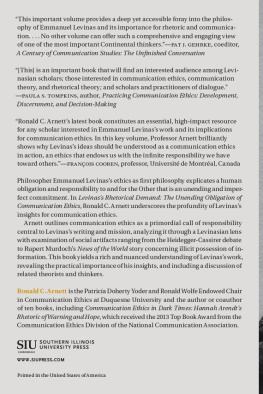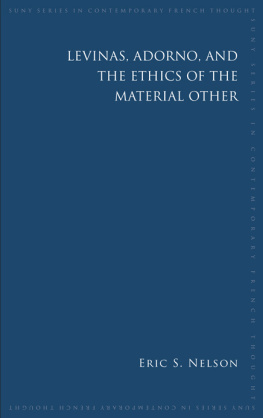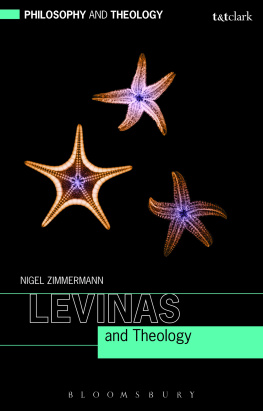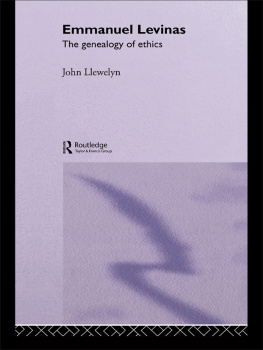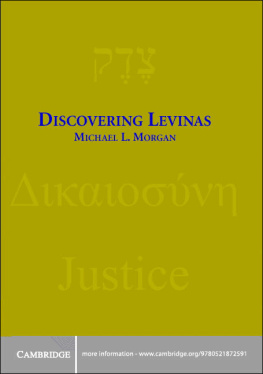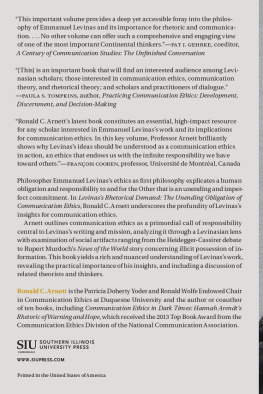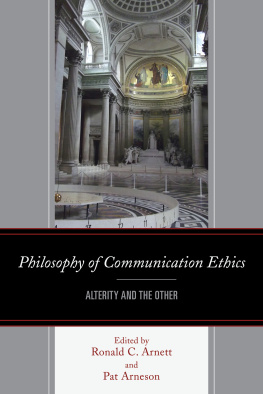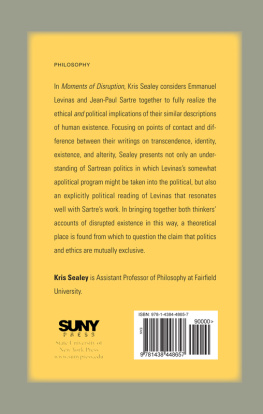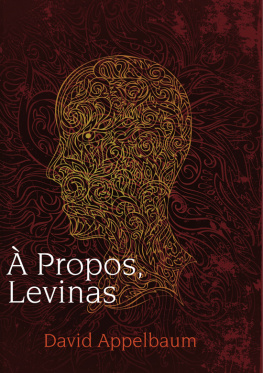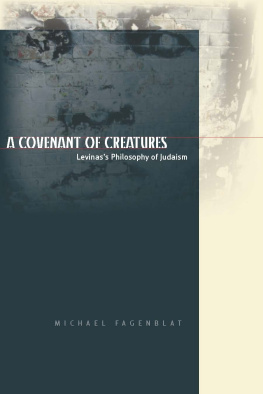Copyright 2017 by Ronald C. Arnett
All rights reserved
Printed in the United States of America
Names: Arnett, Ronald C., 1952 author.
Title: Levinass rhetorical demand : the unending obligation of communication ethics / Ronald C. Arnett ; foreword by Algis Mickunas.
Description: Carbondale : Southern Illinois University Press, [2017] | Includes bibliographical references and index.
Identifiers: LCCN 2016031744 | ISBN 9780809335695 (paperback) | ISBN 9780809335701 (e-book)
Subjects: LCSH: Lvinas, Emmanuel. | CommunicationMoral and ethical aspects. | BISAC: LANGUAGE ARTS & DISCIPLINES / Rhetoric. | LANGUAGE ARTS & DISCIPLINES / Communication Studies. | PHILOSOPHY / Ethics & Moral Philosophy.
Classification: LCC B2430.L484 A76 2017 | DDC 194dc23 LC record available at https://lccn.loc.gov/2016031744
Printed on recycled paper.
Foreword
Algis Mickunas
OHIO UNIVERSITY AND VILNIUS UNIVERSITY
This text is filling a credibility gap in communication that, in the main, is left unattended. To the credit of the author, Professor Arnett, the choice for this filling is the ethical principle of Levinas. The term principle does not suggest a specific dogma but instead a disclosure of a domain overlooked by most ethical theories. To explicate this domain, the author asks the reader to follow Levinas as he debates and counters major modern thinkers concerning human encounters. The reader should not look for an account of the nature of reality or, for that matter, the cosmos; rather, the concern is with human life, the ways of human relationships, and human duty and responsibility with respect to each other. In the text Professor Arnett mentions various phases of the life of Levinas, including his interest in Russian literature, phenomenology, and, above all, biblical studies. While biblical studies is constantly present throughout the text, a brief introduction to the main trends in Russian literature and aspects of phenomenology, relevant to understanding Levinass encounter with the other, is in order. In order, too, is touching on the great debate that seemingly disclosed the very foundations of Western philosophy, the philosophy of Being explicated by Heidegger. This kind of introduction is in the spirit of the author, who introduces literary texts to make the case for Levinas.
Not all traditions are philosophical in the Socratic modestating a position, arguing for it and allowing counterarguments to contest such a position, and having that lead to further contestations and proposals of other positions. In some traditions, main concerns are explicated in stories either by writers or by oral transmission. Russian thinking was hardly a matter of professional philosophers but is best expressed in Russianliterature, which deals with profound metaphysical, social, economic, and moral issues. The term literature is, accordingly, not restricted to stories and novels but extends to essays on topics ranging from metaphysics to revolution. Given such an understanding, it is possible to trace an invariant in Russian literature that was available to Levinas and is still available to us. The invariant is understood to be transcendental, calling for a fulfillment in the Russian lifeworld, extending from the eighteenth to the twentieth centuries. The struggle constituting this calling was and is between the immediately lived, but not thematized, intentionality toward intrinsic human worth, expressed in sacral and secular modes of writing and the world of traditional and Westernizing values. To understand this intentionality it is necessary to make a phenomenological distinction between constitution and construction. Constitutive intentionality opens up or discloses an awareness that either can or cannot be fulfilled in a given lifeworld. The latter is a significative interconnection of all events and objectivities, including a self-interpretation of the subject as being in this lifeworld. It is given as self-evident and taken for granted that all events and objectivities in it are realities in their own right. For example, in the West and East it is granted that we live in an economic world where things, processes, and people have economic value. Whether we like it or not, we understand this world as our reality and cannot see any reason to doubt itdespite our complaints that this reality is unfair to some or even that it should be arranged differently. Even our scientific and technical achievements have the same value. What is crucial is the recognition of value as an invariant in this type of lifeworld.
The great Russian literatures faced this Westernization and modernization and hence were written between two lifeworlds: one that was maintained as an established tradition, the other as a construct of scientific and political enlightenments of the West. The former, the feudal-aristocratic, was deemed to be decadent, corrupt by some, and by others as spiritually superior although in need of revisions, specifically its serfdom. The latter, the Western, while partially unknown and alien, was regarded as the bearer of ideas that would transform Russia and bring it into its proper place as a European nation. While numerous texts categorize Russian writers in terms of Slavophiles and Westernizers, idealistic and materialistic, theocentric and secular, our task is to disclose the lived awareness that comprises invariants that are not posited as objects of reflection. Rather, they involve a tacit awareness in terms of which all judgments are made, whether such judgments are phrased theologically, politically, ethically, socially, or economically. In this sense, the appearance in Russia of Western enlightenmentsbrought in various systems, from romanticism through idealism to materialism, but the invariant of such systems is what has to be understood in order to disclose the Russian challenge to the European Enlightenment and its own tradition. A point worth emphasizing is this: Russian writers occupy a point of crisis between two worlds, such that the crisis transcends both and is a critique from a transcendental position. But to understand these literatures it is necessary to offer a brief sketch of one basic level of enlightenment. This level is accepted by all major figures of the twentieth century, even if not explicitly noted. Thus Heideggers temporal horizon of the possibilities of Being belongs to the modern lifeworld and assumes the priority of the will, as articulated in his rectors speech.
While the process of valuating events in favor of human needs was briefly indicatedthat is, various reductionisms of the human to biochemistry, genetics, and mechanicsthe lived awareness subtending this process intends an objectivity that is unique to enlightenment. One level of this objectivity is designed to be accessible to quantification, and hence it has to be measurable homogeneous matter. This design, of course, is meant by a specific exclusion of the entire perceived world and hence is in no wise accessible to experience. Yet covered by this homogeneous materiality as an intentional object is another intended objectivity: temporal possibility. The lived awareness that intends such an objectivity is an empty will, prior to the question of its being free or determined. It is to be noted that the term temporal does not suggest being in time but rather an open horizon without any specific ontological locus. Hence any temporal location would have to be established within such a horizon. If we attend to the language of enlightenment to date, we shall note that, subtending the question of reality, there is a prior discourse concerning the conditions for the possibility of reality. Such discourse is premised on the first lived intentionality of empty temporal possibility. It opens a horizon of possible intentions and their fulfillment, requiring a second constitution of objectivities: possible valuations of what the will intends as valuable for us. This is the enlightenments alpha and omega: empty temporal possibility and its temporal fulfillment by all that we value as our mode of final being. Both Marxism and capitalism offer the same intentionality. The intentionality of fulfillment of possible valuations as temporal does not lead to perceptualawareness, since the latter, in its naturalistic mode, is quite limited and merely qualitative. Hence the fulfillment requires a constructive intentionality that can establish possible conditions for possible reality. One minor aspect for this establishment is the shift of reason to instrumental rationality whose task is to calculate what reality is valuable for us and then calculate the conditions for how such reality shall be achieved. Values, in this sense, are calculations of possible results realized solely as material. To achieve any value, the human has to be reduced to a system of interests, needs, desires, power, and all must act aggressively against others to fulfill such wants. Indeed, language itself is split into numerous technical discourses. No doubt, the Russian Westernizers took this type of instrumental intentionality for granted but also recognized that

